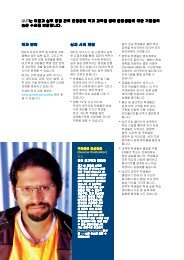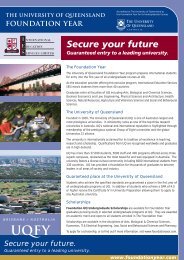UNDERgRADUATE PROSPECTUS - Study Brisbane
UNDERgRADUATE PROSPECTUS - Study Brisbane
UNDERgRADUATE PROSPECTUS - Study Brisbane
- No tags were found...
You also want an ePaper? Increase the reach of your titles
YUMPU automatically turns print PDFs into web optimized ePapers that Google loves.
Engineering, Architecture and Information Technology<br />
additional specialist study and specialist project<br />
work in the aerospace and aviation industry.<br />
Electrical engineers design, build, operate and<br />
maintain much of our electronics and energy<br />
infrastructure, such as the Internet, home<br />
theatre entertainment systems, mobile phones,<br />
digital cameras and television, medical imaging<br />
systems, electrical appliances for homes, scientific<br />
instruments for laboratories, lasers for reliable<br />
high speed communication, satellite systems for<br />
remote sensing of the environment, and reliable<br />
mobile and fixed energy systems to power all of<br />
these. Additionally, as an avionics and aerospace<br />
student, you will be specifically equipped with extra<br />
skills to design the electronics in aircraft and airport<br />
systems.<br />
Electrical and Biomedical Engineering<br />
New discoveries and developments in biology<br />
and medicine have led to the rapid change and<br />
growth of biotechnology research and industry.<br />
Biomedical engineering bridges the gap between<br />
technology, medicine and biology. It integrates<br />
physical, chemical, mathematical and computational<br />
sciences and engineering principles with the aim<br />
of improving health care. This major commences<br />
with a broad foundation of preparatory courses in<br />
engineering, mathematics, biology and physics,<br />
followed by more advanced coursework and<br />
laboratory training, combining engineering analysis<br />
and design techniques with biology and physiology<br />
of cells and organisations. The major is project<br />
focused, and includes a full-year project in the fourth<br />
year to develop individual design and research<br />
skills, an approach valued by employers. Graduates<br />
may be involved in the design, construction and<br />
development of health and monitoring devices and<br />
computers, diagnostic systems and therapeutic<br />
systems. They may also work with models of<br />
physiological function and prosthetics and implants.<br />
Environmental Engineering<br />
(extended major only)<br />
Environmental engineering has developed as a<br />
distinct stream of the engineering profession, and is<br />
a multifaceted, challenging and dynamic profession.<br />
Environmental engineers consider the environment at<br />
the design stage of project development. They predict<br />
the effect of human activities on the environment, use<br />
their design skills to minimise environmental impact,<br />
and promote sustainable development. The challenge<br />
for graduates is to create innovative solutions to<br />
problems. As the basis for a sustainable future, these<br />
solutions must satisfy strict new legislation, be cost<br />
effective in the longer term and be acceptable to the<br />
public.<br />
Mechanical Engineering<br />
Mechanical engineers design and manufacture power<br />
plants, machinery and equipment for industry, and are<br />
expert in producing energy and converting it to other<br />
forms. They work closely with industrial engineers<br />
and managers in many fields to design innovative<br />
machinery and systems that yield economies in<br />
production. They may design turbines, earthmoving<br />
machinery, food processors, air-conditioning and<br />
refrigeration systems, artificial hearts and limbs, and<br />
engines for aircrafts or automobiles. The demand for<br />
mechanical engineers is increasingly broad, as new<br />
industries emerge, and old industries take advantage<br />
of automation developments and new sources of<br />
energy.<br />
Mechanical and Aerospace Engineering<br />
(dual major only)<br />
Mechanical and Aerospace Engineering is based on<br />
the Mechanical Engineering major. You can choose<br />
to take specialised courses in either the aeronautical<br />
or space area. Aerospace engineering is concerned<br />
with the design, manufacture and operation of<br />
aircraft, launch vehicles, satellites, spacecraft and<br />
ground support facilities. It is a particularly challenging<br />
discipline because of the need for lightweight and<br />
extremely reliable designs. This requires the use<br />
of cutting-edge technology and design methods.<br />
Aerospace engineering projects tend to be<br />
multidisciplinary in nature because of the scientific<br />
content of many of the payloads and the complex<br />
thermo-physical aspects involved in operations such<br />
as hypervelocity atmospheric flight. All workers in<br />
this field must be adept at incorporating technology<br />
from outside their immediate specialty. Graduates<br />
are qualified as mechanical engineers and have an<br />
understanding of key issues in the field of aerospace<br />
engineering.<br />
Mechanical and Materials Engineering<br />
Mechanical engineers design and manufacture power<br />
plants, machinery and equipment for industry, and<br />
are expert in producing energy and converting it to<br />
other forms. They may design turbines, earthmoving<br />
machinery, food processors, air-conditioning and<br />
refrigeration systems, artificial hearts and limbs, and<br />
engines for aircrafts or automobiles. The demand for<br />
mechanical engineers is increasingly broad, as new<br />
industries emerge, and old industries take advantage<br />
of automation developments and new sources of energy.<br />
Materials engineering is concerned with selecting,<br />
processing and developing materials to design and<br />
make products. Materials – metals, alloys, ceramics,<br />
polymers and composites – give manufactured<br />
products their functional and aesthetic qualities.<br />
Materials engineers apply their knowledge of<br />
materials behaviour to optimise processing and<br />
improve the properties of products. They are also<br />
involved in controlling the service behaviour of<br />
materials, improving the performance of machines<br />
and structures.<br />
Mechatronic Engineering<br />
Mechatronic engineering is one of the newest<br />
branches of engineering, and has far-reaching<br />
applications to every sector of society. Mechatronic<br />
engineers integrate precision mechanical<br />
engineering with electronics, computer systems,<br />
and advanced controls, to design and construct<br />
products and processes. Microscale sensor and<br />
actuator technologies are developed and applied to<br />
create intelligent consumer products. Mechatronic<br />
engineers are in great demand, as industries seek<br />
to apply evolutionary advances in computers,<br />
electronics, sensors, and actuators to improve their<br />
products, processes and services. As a graduate<br />
you will have the knowledge and skills to design<br />
and build advanced products, such as robots and<br />
machine tools; scientific instrumentation; and high<br />
performance automatic suspension and braking<br />
systems.<br />
Mining Engineering<br />
Mining engineering involves extracting valuable ores<br />
from the ground for processing and use. It involves<br />
all phases of mining operations, from exploration<br />
and discovery, through feasibility, development,<br />
production, processing and marketing, to final land<br />
restoration and rehabilitation. Responsibility for the<br />
development and production phases of a mine<br />
requires a broad knowledge of all mining operations<br />
and skills in leadership and industrial relations.<br />
Software Engineering<br />
Software engineering is the systematic approach<br />
to developing, operating, maintaining and retiring<br />
software, which is the controlling element of<br />
computer-based systems. As society becomes<br />
more and more dependent on computers, one of the<br />
biggest challenges is creating new software. Software<br />
engineering deals with the challenges associated<br />
with large-scale, high quality software, such as size<br />
and complexity, cooperation between developers,<br />
clients and users, and evolution of software over<br />
time to maintain its value. Software engineers use<br />
principles of computer science, engineering, design,<br />
management, psychology, sociology, and other<br />
disciplines to design and manage large software<br />
systems. Team and individual projects are a focus of<br />
this major, an approach valued by employers.<br />
Software Systems and Aerospace<br />
Engineering<br />
Software Systems and Aerospace Engineering<br />
combines a full single major in Software Engineering<br />
with additional specialist study and project work<br />
in the aerospace and aviation industry. Software<br />
engineering is the systematic approach to developing,<br />
operating, maintaining and retiring software, which is<br />
the controlling element of computer-based systems.<br />
Software engineering deals with the challenges<br />
associated with large-scale, high quality software.<br />
Software engineers use principles of computer<br />
science, engineering, design, management,<br />
psychology, sociology, and other disciplines to design<br />
and manage large systems. In the aerospace industry,<br />
systems such as aircraft are a mixture of electronics,<br />
software and mechanical devices that need to operate<br />
at exceptional levels of safety and reliability. This major<br />
includes a strong component of systems engineering,<br />
which allows designers to describe and understand<br />
such complex systems.<br />
Career opportunities<br />
The UQ engineering degree is highly regarded<br />
and employment prospects are excellent.<br />
Engineers find employment as consultants, in<br />
government, and in many areas of business and<br />
industry. Engineering specialisations include:<br />
Computer systems: telecommunications; signal<br />
and image processing; robotics and intelligent<br />
systems; embedded systems development;<br />
electrical power generation, transmission and<br />
distribution; biomedical engineering, including<br />
biomedical imaging and signal processing for<br />
biomedical applications.<br />
Electrical: six specialty areas: power generation<br />
and transmission, electronics, computers,<br />
communication systems, instrumentation and<br />
measurement, and automatic controls — generally<br />
in the telecommunications industry, mining and<br />
transport sector, computer industry, power<br />
generation and transmission industries, or in large<br />
and small electronics companies. Many graduates<br />
form their own companies quite early in their<br />
careers.<br />
Environmental: work with consulting engineers and<br />
processing companies in Australia and overseas;<br />
government departments and agencies.<br />
Mechanical: Very large mining, refining,<br />
construction and manufacturing companies, to<br />
small or self-owned companies; government<br />
departments, private building services, and<br />
consulting engineering companies.<br />
Mechatronic: product development, mining and<br />
manufacturing industries; aerospace and defence<br />
sectors, self-owned companies and government<br />
and industry research groups; or wherever there is<br />
potential to improve how computer and electrical<br />
hardware is integrated with mechanical systems.<br />
Mining: mining companies, initially at the mining<br />
centres where minerals are extracted, then,<br />
with experience; senior managers or technical<br />
specialists, mine inspectors and advisers to<br />
government bodies. Many are employed by<br />
international companies, and gain overseas<br />
experience; civil engineering companies to<br />
supervise tunnelling and open-cut operations for<br />
railways, roads, hydroelectric and sewerage works.<br />
Dual degree programs<br />
– Arts<br />
– Biotechnology<br />
– Business Management<br />
– Commerce<br />
– Economics<br />
– Information Technology<br />
– Science<br />
Additional cost<br />
– Safety boots (AS2210) (up to $140)<br />
– Senior First Aid Certificate (including CPR)<br />
(approximately $155)<br />
– Hard hat (AS1801) ($15)<br />
– Safety induction program ($40 with group, or $80<br />
individual)<br />
– Travel and living expenses associated with<br />
vacation work, fieldwork, or work experience<br />
International contact details<br />
International Student Advisor<br />
Online: www.uq.edu.au/international/enquiry<br />
Phone: within Australia (free call): 1800 671 980<br />
Outside Australia: +61 3 8676 7004<br />
UNDERGRADUATE <strong>PROSPECTUS</strong> FOR INTERNATIONAL STUDENTS 2012<br />
79

















